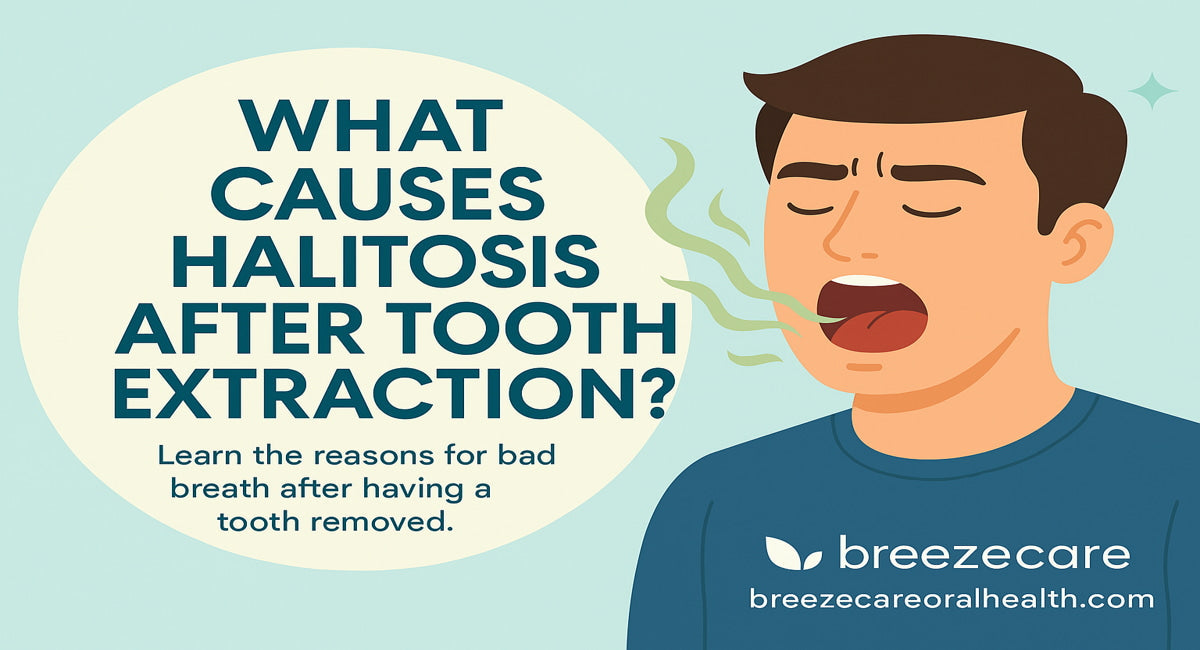Had a tooth pulled, and now your breath smells less than fresh? You’re not imagining it. Halitosis after tooth extraction is a surprisingly common side effect that can catch many people off guard.
While tooth removal, whether due to decay, damage or impaction, is often essential for your oral health, it can sometimes leave you with a lingering bad taste.
So, what’s behind that sudden bad breath? In this article, we’ll break down the most common causes of halitosis after tooth extraction, how long it typically lasts, when to worry and what you can do to treat and prevent it.
Whether you're fresh out of the dentist’s chair or prepping for an upcoming procedure, keep reading. This guide covers everything you need to know.
What Is Halitosis?
Halitosis is the medical term for chronic or persistent bad breath, the kind that doesn’t go away with a mint or a quick brush.
Unlike temporary odours caused by foods like garlic or onions, true halitosis usually points to an underlying issue in the mouth or digestive system.
Common causes include:
-
poor oral hygiene
-
gum disease
-
dry mouth (xerostomia)
-
bacterial infections.
-
medical conditions
-
medications
-
complications after a dental procedure like tooth extraction.
Is Halitosis After Tooth Extraction Normal?
Yes, halitosis after tooth extraction is fairly common, especially within the first few days following surgery. This is typically due to the healing process, dietary changes and restricted oral hygiene routines.
However, persistent or worsening bad breath can sometimes indicate a complication that requires dental attention.
Common Causes of Halitosis After Tooth Extraction
Below are the most common reasons you might notice halitosis after an extraction:
1. Blood Clot Formation and Breakdown
After a tooth is removed, a blood clot naturally forms over the socket to protect it during the healing process. This clot can have a metallic or unpleasant odour as it breaks down, which can contribute to temporary bad breath.
2. Dry Socket (Alveolar Osteitis)
One of the most common complications is a dry socket, which occurs when the blood clot either fails to form or becomes dislodged. Without this protective barrier, the nerves and bone are exposed, leading to pain, inflammation and a foul smell that can cause significant halitosis.
3. Food Debris in the Socket
Following extraction, it’s easy for food particles to become lodged in the socket, especially if rinsing and brushing are avoided. These trapped particles can rot, creating a strong odour and bacterial build-up.
4. Bacterial Infection
An infection in the extraction site is another potential cause of halitosis after tooth extraction. Symptoms often include swelling, pus, pain and an unpleasant taste or smell in the mouth. If you notice these signs, contact your dentist as soon as possible.
5. Poor Oral Hygiene Post-Surgery
After extraction, patients are often advised to avoid brushing or rinsing too vigorously for the first 24 hours. While this is essential for healing, it can allow bacteria to build up temporarily, contributing to bad breath.
How Long Does Halitosis Last After Extraction?
In most cases, halitosis after tooth extraction is temporary and resolves within a few days as the mouth heals. However, if bad breath persists for more than a week or is accompanied by severe pain, swelling or discharge, it's best to see your dentist.
Read Also: How to Remove Alcohol Smell from the Mouth Quickly
Tips to Prevent Halitosis After Tooth Extraction
Here’s how you can minimise bad breath and promote faster healing:
-
Follow Your Dentist’s Instructions Carefully
Stick to your post-operative care plan, including when and how to rinse, what to eat and how to manage pain. -
Use Saltwater Rinses
After the first 24 hours, gently rinse with warm saltwater to clean the area and prevent infection. -
Maintain Good Oral Hygiene
Carefully brush and floss the remaining teeth while avoiding the extraction site. -
Stay Hydrated
Drinking plenty of water helps keep the mouth moist and flush out bacteria. -
Avoid Smoking and Alcohol
These substances can delay healing, contribute to dry socket and increase the risk of bad breath. -
Choose Soft, Odour-Neutral Foods
Stick to bland foods like yoghurt, mashed potatoes and soup to avoid strong food odours.
When to See a Dentist
You should consult your dentist if:
-
Bad breath persists beyond 7–10 days
-
You experience sharp or increasing pain
-
There’s a foul taste or pus from the socket
-
You develop a fever or swollen glands
These symptoms may indicate infection or dry socket and require professional treatment.
Final Thoughts
While halitosis after tooth extraction can be a nuisance, it’s often temporary and part of the normal healing process.
With proper care, good hygiene and a close eye on your symptoms, you can manage post-surgical bad breath effectively.
If you’re experiencing persistent bad breath or discomfort after a tooth extraction, don’t hesitate to reach out to BreezeCare. Prompt care can prevent complications and ensure a smooth recovery.











